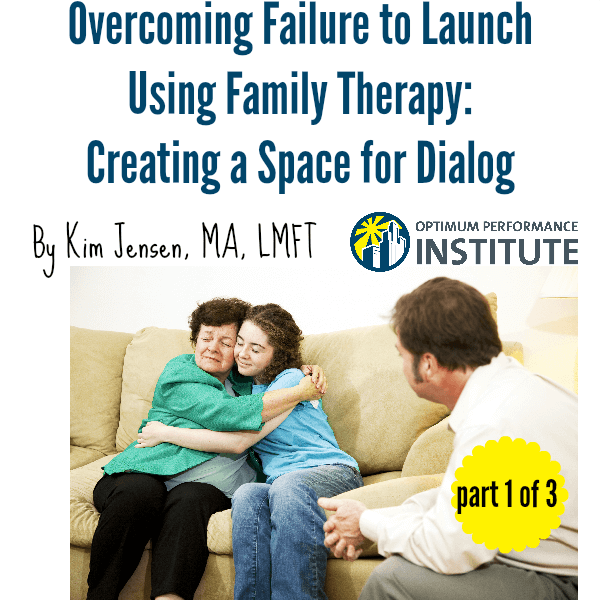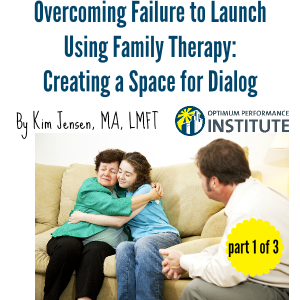
Overcoming Failure to Launch Using Family Therapy: Creating a Space for Dialog (PT 1)
On Parenting
If your children are objects
To fulfill your needs,
Chances are they will give up their dance
To dance with you,
And they may spend much of their lives
Just trying to figure out who they are.
By
Bill E. Goldberg
 In my work with couples and with families where young adults are experiencing failure to launch issues, again and again, what I find is the need to build an effective space in which all parties create an ability to be heard and validated. This space has been denigrated over the years through miscommunication, mistrust, and emotional reactivity. Problems never seem to get resolved due to the volatility and toxicity that these issues and patterns have created within the family. Seemingly meaningless issues have become emotional torrents due to the absence of effective communication. These negative patterns then become the operating systems that the family utilizes for communication, creating a maladaptive environment where individuals cease to be heard or valued. The challenge then for family therapy becomes the ability to create a new forum, with new skills, that enable the family unit to function effectively through positive communication and empathy.
In my work with couples and with families where young adults are experiencing failure to launch issues, again and again, what I find is the need to build an effective space in which all parties create an ability to be heard and validated. This space has been denigrated over the years through miscommunication, mistrust, and emotional reactivity. Problems never seem to get resolved due to the volatility and toxicity that these issues and patterns have created within the family. Seemingly meaningless issues have become emotional torrents due to the absence of effective communication. These negative patterns then become the operating systems that the family utilizes for communication, creating a maladaptive environment where individuals cease to be heard or valued. The challenge then for family therapy becomes the ability to create a new forum, with new skills, that enable the family unit to function effectively through positive communication and empathy.
As the facilitator or holder of the space at these sessions, my job becomes part mediator, part teacher, and part WWE referee. Creating the space and holding it consists of having the family agreeing on ground rules from which to operate. Often times creating change means creating new verbiage and concepts that then become the tools from which to construct new ways of communicating. Real and lasting change comes from the reestablishment of these familial patterns and operating systems. What I have found useful and important in this process will be outlined in a three part series covering the following categories: Effective Communication, Active Listening, and Moving On. Let’s start today with Effective Communication. Look out over the next few weeks for the latter sections. You may click here to subscribe to our Overcoming Failure to Launch Newsletter to be notified.
Effective Communication
I Statements
Effective Communicating starts with taking ownership of what you say and how you say it. Using “I Statements” helps to takes ownership of what you are saying and feeling and creates less of an opportunity for the other person to feel attacked and become defensive. An example of phrasing we would want to change: Little Johnny can’t “make you mad” by what he says or does; being angry with something that he said or did is a personal choice of reacting to a negative stimulus based on conditioning and your own family history. Prefacing the statement with “I think…” or “I feel…” aids in clarifying and personalizing the statements. So being able to re-frame “You make me so angry when you don’t listen to me” to “I’m feeling disrespected right not because it sounds like you are not listening to what I am saying to you” effectively re-frames what the speaker is really experiencing and wanting to communicate in the moment. Taking ownership of how and what you are communicating helps to establish direct communication and avoids misinterpretation.
Thoughts vs. Feelings
Effective communication includes the ability to distinguish between what you are thinking and what you are feeling. How many times have we heard communicated something to the effect of, “I’m feeling like you don’t listen to me or care what I’m thinking”? Being able to delineate between what is a thought and what is a feeling aids to clarify and more effectively communicate what the speaker is experiencing. So, the above interaction could more accurately be reflected as: “I’m feeling hurt because I’m thinking that you are not paying attention to me.”
Thoughts can be summarized in a statement such as “I’m thinking that staying up late last night might not have been such a great idea with your SATs happening this morning.” Feelings can be identified as those emotions that make up the rainbow of our emotional life experience: Love, Hurt, Delight, and the myriad of other emotions that we experience.
TIP: Some people find it effective to create a deeper emotional vocabulary by utilizing an index card, listing a spectrum of emotions on it to help in identifying what they are feeling in the moment if “feeling stuck” is an issue in communicating feelings.
Secondary Emotions:
A word about Anger as an emotion… Anger is usually a secondary emotional response to a situation. A child saying something to the effect of “I don’t love you anymore” may lead the parent to “feel angry”; however, in unpacking the situation, a more accurate response would be “hurt.” So that the parent’s response in the situation would more accurately be “I feel hurt by what you said” rather than “You made me really angry right now.”
“I Understand”
Oftentimes parents want to try and demonstrate validation by telling their child that they “understand” what the child is trying to communicate. I have heard reflected back to parents “how can you possibly understand what I am going through, because you have never experienced anything like this and you are not me?” They have a point. Being able to reflect back more accurately: “It sounds like what you are experiencing right now must be really difficult…”, “What you are going through right now must be really hard,” or “I remember that being a teenager was really hard” more accurately reflects the empathy back to the speaker that the person wants to demonstrate.
In OPI’s ROANNE Track (for young adults specifically suffering from Borderline Personality Disorder or Borderline Traits), we utilize Dialectical Behavior Therapy (DBT) to teach effective communication. The unit “Interpersonal Effectiveness” may be useful for those wanting to gain more experience and knowledge with interpersonal communication.
► Click HERE to read Part 2 of this article ◄
More soon! You may click here to subscribe to our Overcoming Failure to Launch Newsletter to be notified when part 3 “Moving On,” and other Overcoming Failure to Launch Articles are released.
For more information on how we support healing broken family community patterns with the young adults in our programs, reach out! At Optimum Performance Institute, we offer compassionate, clinically sophisticated intensive residential help for young dealing with mental health and learning disability issues causing them issues with a failure to launch to the next stage of development (college, work, living independently). Rather than a sterile, hospital-like environment, we offer beautiful accommodations in luxury apartments just outside of Los Angeles. At OPI, we treat the individual, not the diagnosis. We are a diverse community of passionate, highly skilled individuals working together with you to help you find your joy and express it. For more information on OPI residential programs and our measures to help young adults with Bipolar Disorder, call us at (888) 814-5985 or click HERE to submit an online form. We’ll be in touch promptly.
